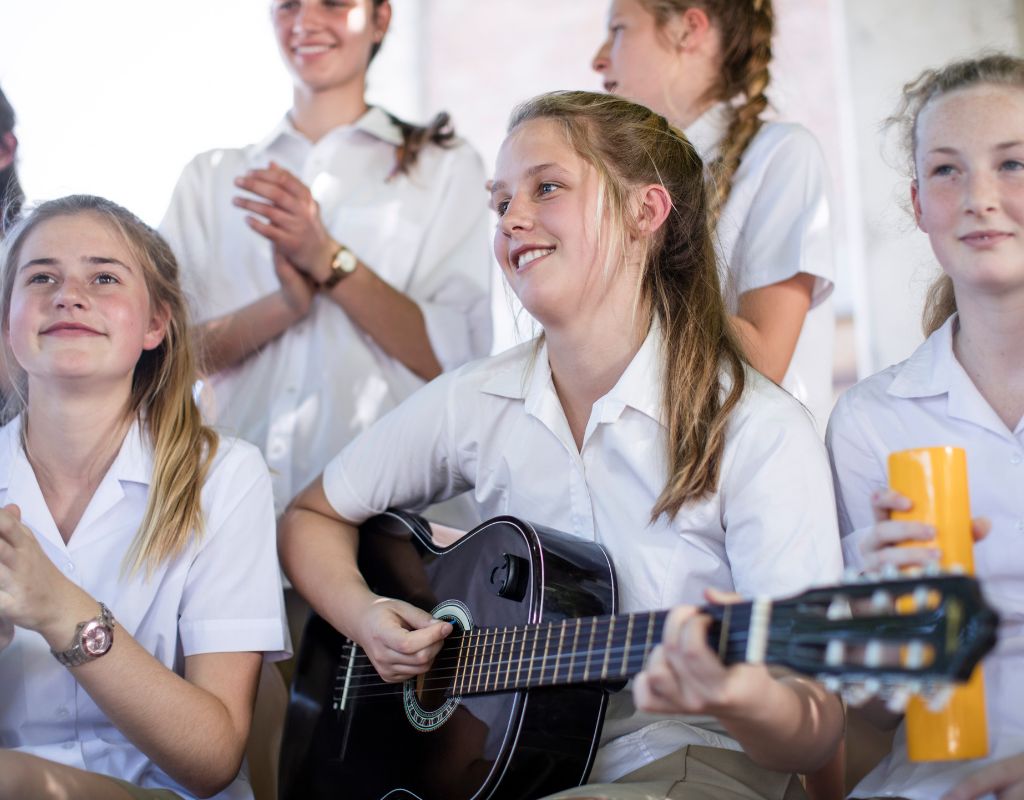Your child’s transition from primary school to high school can turn you into a logistics professional overnight. New corridors, transport changes and a fresh group of teachers all land at once. Even organised children can stumble: bags aren’t packed, lifts fall through, homework piles up and confidence dips.
Give your child and yourself a fully-fledged plan. With sure-fire strategies to plan the transition, such as a two-week transition to earlier bedtimes, practising the route and a shared calendar for lifts, you’ll easily take your child’s school routine from falling to flying.
What Changes from Primary School to High School?
High school feels bigger. New faces. New corridors. Your child will finally have a timetable that actually moves, with different teachers for every subject. While this means more independence, it also entails increased responsibility.
If your child is moving to a new high school, their travel arrangements may need to be adjusted. Travel changes often require a new wake-up and school-leaving routine. The key is to help your child plan, rather than doing it for them, and encourage them to ask questions.
There is also the social aspect, your child will be discovering new friendships and activities with their peers. With calm routines and open chats, Grade 8 becomes a confident new start.
How to Prepare Before Day One
Start a gentle plan a week or two before school begins. Shift bedtime earlier, lay out the uniform. Really, you want to start to transition your child to building and using their own routines.
Work Through the School’s Stationery List Together
Depending on your child’s school, the differences between primary and high school stationery are a few but significant. Notes, rubrics, and exam prep are significantly more in grade 8. Additionally, where the teacher did all subject planning, your child will now need their own planner to track deadlines and dates.
Build a simple pencil case set that can be replaced all at once, including pens, HB pencils, highlighters, a ruler, eraser, sharpener, glue stick, and scissors. Add a maths set and a calculator only if the school requires one. Keep a small top-up box at home with spare labels and extra supplies.
Make Day One Feel Familiar
Do a practice run to school at the right time of day. Help your child find the correct gate, office and bathrooms. Agree on a clear pickup point and a backup plan in case the transport falls through.
Ideally, you want all your child’s school gear and lunch packed the day before. Any parent will admit that it’s difficult to get this done consistently, but if you can help them in the first few weeks, then it will be a bit easier to make the transition from primary to high school.
Complete any forms and update medical details and emergency contacts, especially if your child is changing schools. Discuss common first-week moments with them and rehearse simple phrases for asking help from a class teacher, grade head, or counsellor. Keep the first few afternoons calm and light. With small steps and steady routines, day one feels familiar before it even arrives.
Orientation Days & School Tours
Use orientation to turn the unknown into familiar. Arrive a little early to help your child get settled and find their bearings. Even if you can’t be as hands-on as you once were, you will still play a crucial role as a parent.
Meet the people who matter for day one. A quick hello to the class teacher, the grade head, and the counsellor makes asking for help easier later. If sign-ups for clubs or trials are open, let your child put a name down for one or two that feel exciting.
The goal is simple. Fewer surprises, calmer first steps and a school that already feels known.
When to Speak to a School Counsellor
Do not wait for a crisis before reaching out for support. If worries persist after the first few weeks and mornings bring on tears or stomachaches, it may be time to seek help from teachers or other resources.
Ask for help when marks drop sharply, homework takes hours, sleep or appetite changes, or there is bullying, grief or a big family change. Difficulty with focus, reading, writing or organisation is also a good reason to talk.
School-Based Support Teams
An SBST is the school’s problem-solving team for learning, behaviour and wellbeing. It brings teachers, heads of grade, support staff and sometimes therapists together to plan practical help for a learner. The team works within the Department of Basic Education’s SIAS policy, linking the school to district support where needed, and can help children overcome anxiety.
Plans are written down, tried in class, reviewed, and you will be told who to contact. Your child’s dignity and privacy matter, so support is handled discreetly and only the relevant staff are informed. With early contact and clear steps, the SBST helps schools feel manageable again.
Where criteria are met, the SBST can guide an application for accommodations such as extra time, a reader, a scribe, rest breaks, a separate venue or assistive technology. Schools follow provincial processes and deadlines, so ask early about timelines, required evidence and renewal periods.
Managing Extracurriculars for New High Schoolers
Extramurals are where belonging grows. Encourage your child to start small, perhaps one cultural activity and one sport.
Trials and auditions often occur within the first two weeks, so watch the notices and let them put their name down early. Seasons matter in South Africa. Summer brings cricket, swimming and athletics. Winter brings rugby, hockey and netball.
Plan the practical bits together. Check kit lists, label everything and note any activity levies. Save practice times and venues in a shared calendar and agree on how transport will work. Confirm a safe pickup point and a backup if a lift falls through. Keep one or two afternoons free so homework and rest do not slip. A water bottle and sunscreen go a long way in summer, and warm layers help in winter fields.
Commitment counts, but fit matters too. If an activity drains more than it gives after a fair attempt, it is fine to change at the end of a term and to thank the coach or teacher in charge. Celebrate effort, punctuality and teamwork. With the right balance, extracurriculars build skills and confidence that carry over into the classroom.
Academic Shift
High school brings a clear academic step up. Lessons move faster, specialists teach subjects, and your child will work across a wider mix of tasks that count toward the term mark.
Expect regular quizzes, projects, practicals and oral presentations alongside tests and exams. Subjects are more defined, from Mathematics and Natural Sciences to EMS, Technology and Creative Arts, with marking rubrics and specific learning outcomes that set the standard for each piece of work.
Help your child adjust by developing steady study habits rather than relying on last-minute efforts. Set a weekly timetable with short daily slots, use a simple planner, and keep one notebook or digital folder per subject. Encourage them to read the instructions twice, check the rubric before they start, and ask their teachers early if anything is unclear.
Teach a light review after each lesson, then a deeper recap at the end of the week, and use past papers to practise exam-style questions. With these routines, the academic shift feels manageable, and confidence grows quickly.
Parent–School Partnership
A strong partnership with your child’s new teachers begins with clear and regular communication. Read the weekly notices, save key dates and note key parent-teacher feedback together so your child sees that messages matter.
Keep contact details up to date and agree at home on how information will be transferred. When concerns arise, start with the class or subject teacher, then the grade head if needed. Use a short email with your child’s name, class and the issue in one line, and ask for two or three meeting times that suit the school day.
The School Governing Body
Know the role of the School Governing Body. The SGB sets policy on issues such as the code of conduct, language, uniform and fees, and it approves the annual budget. Parents vote for SGB members and can attend the annual meeting where fees and policies are presented. If you have questions about policy, please raise them through the SGB channels rather than with individual teachers. Keep classroom queries with the teacher or grade team.
Most public schools follow CAPS in the Senior Phase, while many independent schools follow the IEB. In Grade 8, your child studies a set mix of subjects, with language choices at Home Language and First Additional Language level. Ask early about language streams and any support available for learners who need to change their language levels.
Scholar transport and lift clubs are common. Confirm whether your child will use a registered transport provider or family lifts. Save the driver’s details, and teach your child what to do if a lift falls through.
The code of conduct is a crucial component of school policy that will guide your child throughout their high school journey. Go through the uniform policy and phone rules together so that expectations are clear for both you and your child. Many schools have established arrival times, late-arrival procedures, and rules for sports kits.
Parent-Teacher Feedback
Track your child’s academic timelines so teacher feedback never arrives as a surprise. Save assessment calendars, report dates and parent evening schedules. Help your child prepare one or two questions for a teacher meeting and bring recent work or rubrics if you want specific guidance.
Share relevant updates, such as medical notes, learning support reports, or changes at home that may impact concentration or attendance. When school and homework are in step, your child learns that support is consistent.
Read More: Tips for Matric Exams in 2025
Key Takeaway
Small, steady routines beat last-minute scrambles. Help your child plan, keep communication open and use support early.
Final Thoughts
Every family’s start looks different. Focus on the basics, review weekly and adjust what is not working. If challenges persist, speak to a counsellor or the SBST.
For a calmer start, explore iRainbow’s Grade 8 resources or send us a quick message to enquire about educational software for a comprehensive academic support tool.




